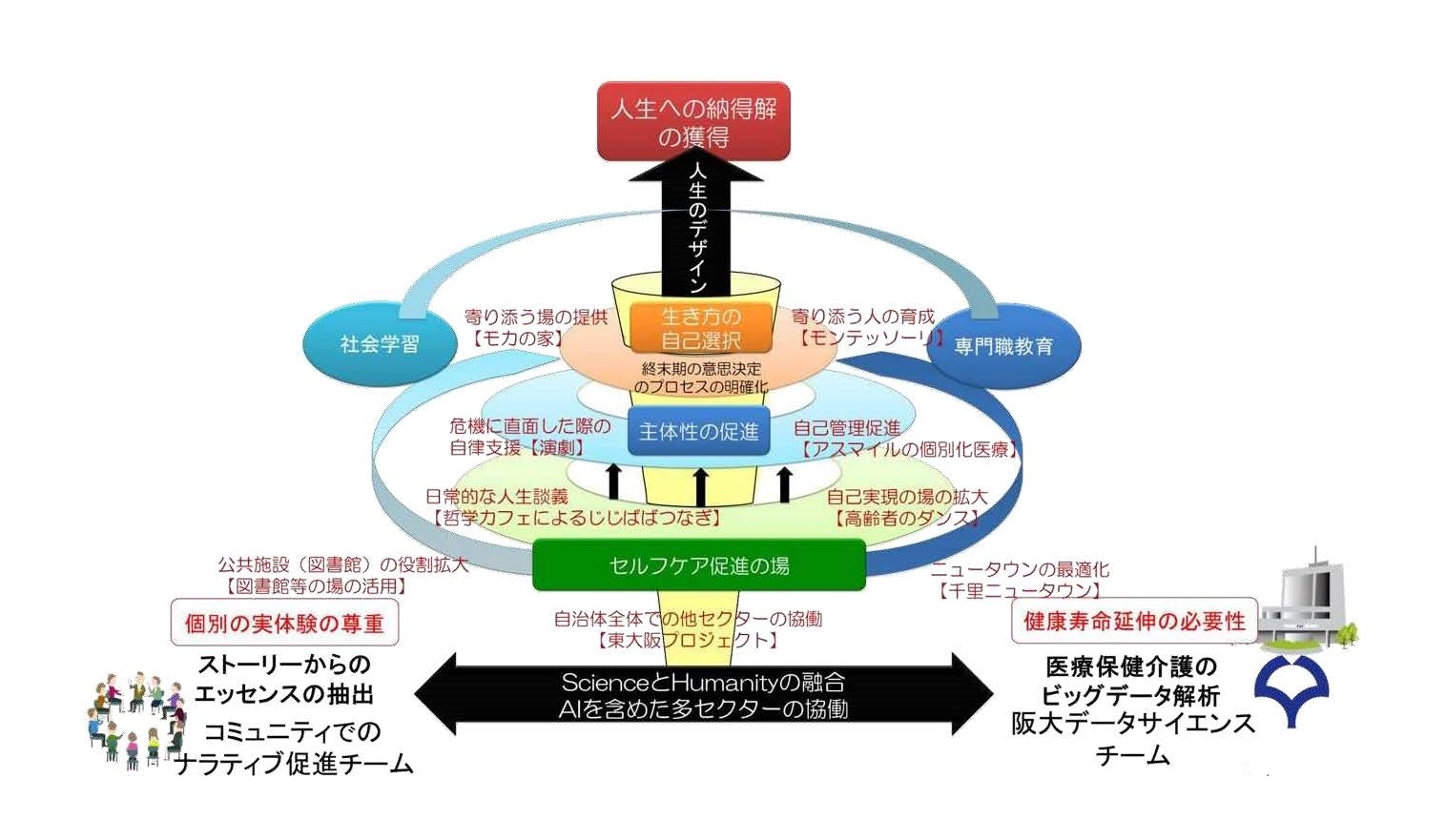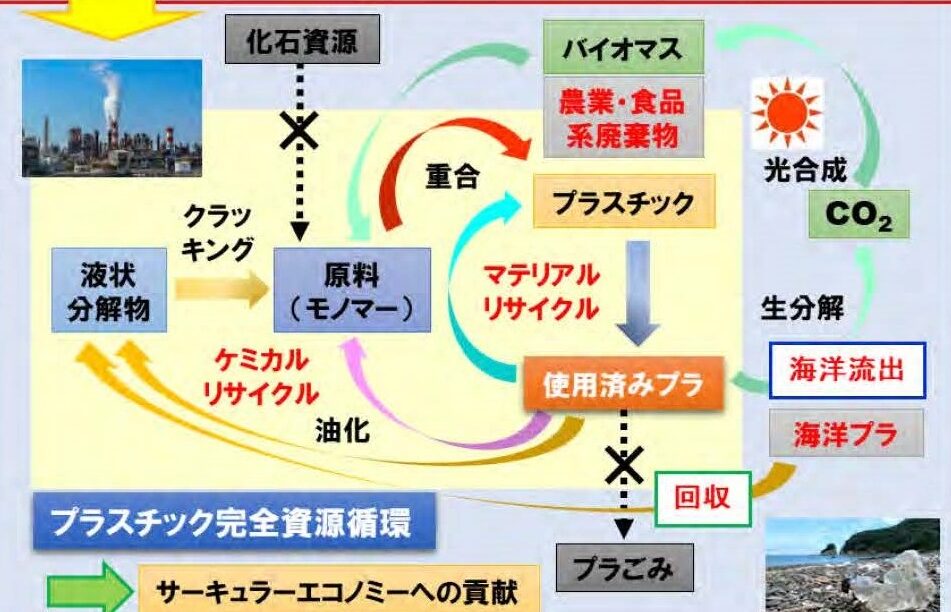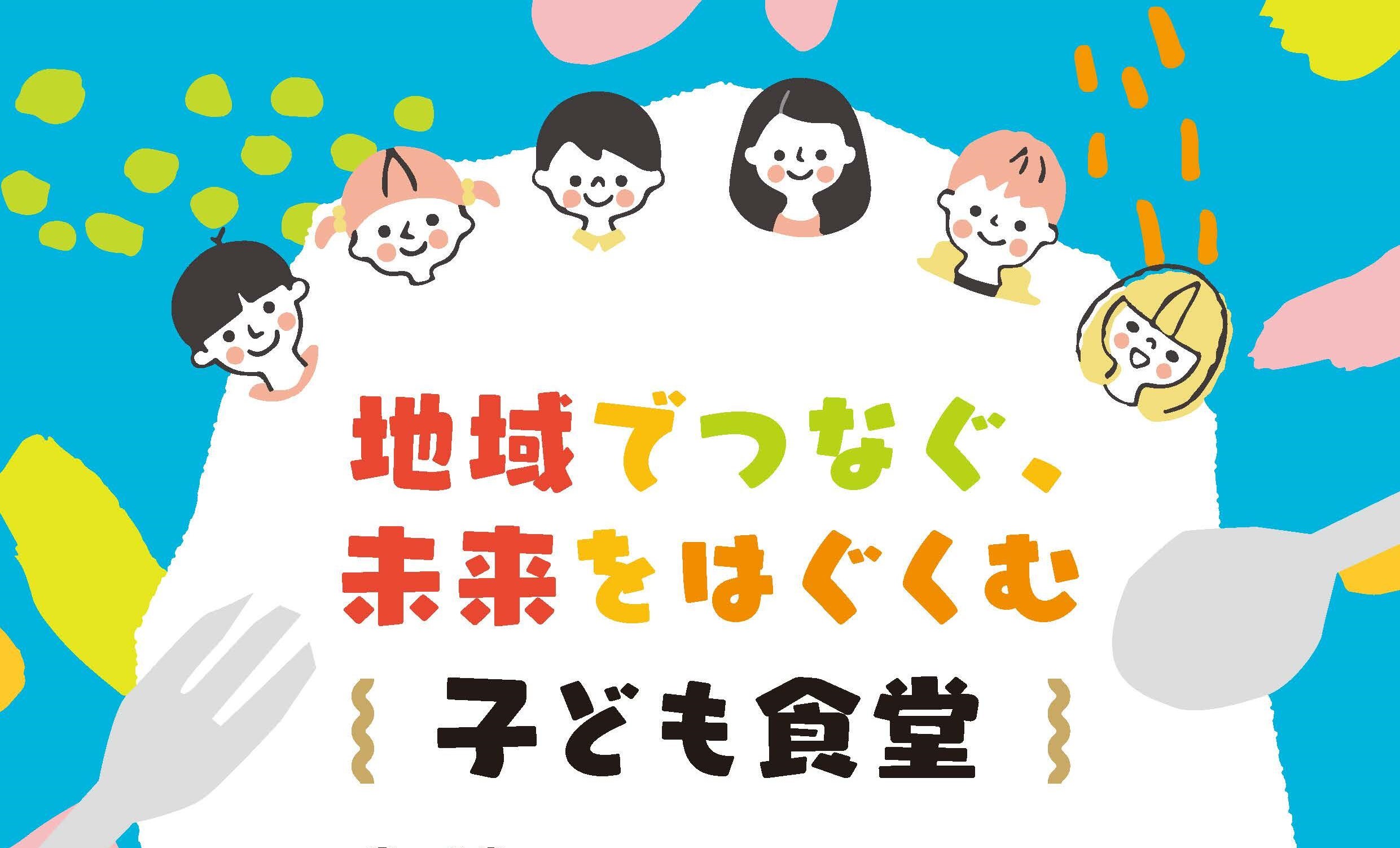What is Core Project?
Core Project is a project that We SSI proactively promote in order to conceive and realize a society where life is valued and where everyone shines.
We target the project whose representative is a researcher in Osaka University and for adopted projects, we provide full support, such as subsidizing research expenses.
Now following 5 core projects are advancing research aimed at solving social issues from the perspectives of "protecting", "nurturing" and "bonding" life.
-

Development of Educational Curriculum and Programs for the Citizen of Next-generations who can co-create public knowledge based on their own life experiences
-

Science and Humanity for Fostering a Super-aged Society that Respects Individual’s Views on Life and Death and Their Autonomy
-

Co-creation base of resource recycling that aims for zero plastic waste in Osaka Bay
-

Nuturing children and future with local community: Practice and theory of the co-creation network
-
Realization of an empathetic economy through the promotion of stakeholder-ESG management, ethical consumption and sustainable procurement
- Development of Educational Curriculum and Programs for the Citizen of Next-generations who can co-create public knowledge based on their own life experiences
- Science and Humanity for Fostering a Super-aged Society that Respects Individual’s Views on Life and Death and Their Autonomy
- Co-creation base of resource recycling that aims for zero plastic waste in Osaka Bay
- Nuturing children and future with local community: Practice and theory of the co-creation network
- Realization of an empathetic economy through the promotion of stakeholder-ESG management, ethical consumption and sustainable procurement
(as of Apr 2024)
Core Project
Development of Educational Curricula and Programs for Next-generation citizens who can co-create public knowledge based on their own life experiences
OKABE Mika |Professor, Graduate School of Human Sciences
Our project aims to design and establish a new type of education and welfare network system in which all citizens in a society, including children and minorities, are actively involved as agencies, and then to promote their public and political participation.
To achieve these aims, it is necessary to reexamine and redefine the boundaries between existing categories or within existing systems that have long been used in the modern society, but are already dysfunctional today. These boundaries refer to social categories such as adult/child, man/woman, professional/amateur, western/non-western, normal/abnormal, and public/private, as well as concepts of individual, others, subject, family, nation-state, ethnicity etc. In addition, we have to reexamine and reconstruct official administrative systems, legal systems, academic systems, and school systems on which our modern society has been based. We now need to not only reexamine or redefine these boundaries but also redraw or eliminate them, and then to produce and promote various fruitful collaborations across/beyond them.
The most important factors required to realize these collaborations are the following two. One is to highly value the “words” that citizens, especially children and minorities, co-create to configure and express their own life experience, above/besides “Words” borrowed from authoritative sources such as school textbooks, official documents, or mass media. The other is to foster coming generations who can cultivate and refine their “words” into the public knowledge shared by citizens, which should improve and re-design our society. In this way, various social reforms can be promoted through the public and political participation of each citizen, without anyone left behind, even those who have up to now been excluded or marginalized from the existing society.
This project will make theoretical and some practical attempts to reexamine and redefine various boundaries in order to develop educational curricula and programs with such public knowledge configured and constituted by “words” co-created by citizens, as mentioned above.
Through these attempts, this project aims to enable all citizens
-to live their own life and culture with vitality
-to express their thoughts and ideas assertively and impartially
-to improve or reconstruct our society based on diversity, plurality, and equity, where the public knowledge should be configured and consist of “words” co-created by citizens and be highly valued as the public property in our society.
*In this project, “minorities” are those whose words and actions are likely to be regarded as ‘abnormal’ or ‘exceptional,’ which is the reason they often get special attention and are demanded to make excuse for the majority; in addition, sometimes they are marginalised or excluded. The important issue for inclusive education is not to integrate minorities into the majority.
* Intersectionality should be emphasized in inclusive education. This is a perspective where multiple attributes intersect to examine and improve the situations and structures of disparity, discrimination, and oppression in existing societies. For example, the social issue of gender disparity and discrimination in the Third World should be considered in intersection with the social issue of the North-South Problem in the international society (economic and political disparity between the First and Third Worlds).
This project includes the following activities:
Theoretical Approach:
-Reexamining and redefining categories and systems which have been established in modern society.
-Reexamining the center–periphery structures in modern society (keeping in mind the intersectionality)
-Setting up a theory that enables citizens, including children and minorities, to co-create “words”
Practical Approach:
-Shonai Sakura School action research
-Career education research group for high schools
-Research group for evening junior high schools
-Action research on drama education
-SDGs education/Expo promotion group
Through these activities, this project aims to develop and disseminate educational curricula and programs for citizens to co-create “words.” It also aims to establish system networks and organize local groups for co-creating “words” through collaborations among citizens, especially children and minorities.
Science and Humanity for Fostering a Super-aged Society that Respects Individual’s Views on Life and Death and Their Autonomy
YAMAKAWA Miyae | Associate Professor, Graduate School of Medicine
For these five and a half years, we have cultivated networks with neighboring local authorities, regional medical care, public health/welfare participants, and residents through the Osaka University’s cross-disciplinary research on dementia and the SSI’s core project “Creation of Super-Aging Society Encouraging Respect for Individual Views on the End-of-Life Good and Honorable Death and Supporting Personal Autonomy in Health Care.” In this project, we will further develop the activities and regional network to empower every person’s living in a super-aged society with diverse views on life and death.
In this project, with a special emphasis on every person’s living in a super-aged society, we will design schemes that enable every person to create their own lives through learning and feeling close to social networks. Through developing an approach that combines each person’s “humanity” and “science”, the project aims to organize an environment where individuals can design their own life as an “art” and obtain a solution to various problems caused by aging that is satisfactory to themselves.
“Autonomy,” as defined in this project, does not mean that one must do everything on one’s own, but rather that one can express one’s will to the end of one’s life as much as possible with using various resources in the community. This project will aim to foster a super-aged society that respects individual’s views on life and death and their autonomy.
Specific activities of this project include,
1.To visualize peaceful end-of-life care practices that enhance the dignity of the individual to the end of life in serviced housing for the elderly and to examine its educational methods
2.To establish outpatient nursing care for Mild Cognitive Impairment with using ICT
3.To assess spaces for community’s coexistence in public libraries
4.To create a methodology to activate local community in aged new towns
5.To extract ways to reduce medical and healthcare costs and promote autonomous health behaviors with using big data linking medical care receipts and specific health checkup data in Osaka Prefecture
6.To increase opportunities where the elderly can express themselves
7.To establish local medical and healthcare network
8.To hold philosophy café and forum by other sectors in neighboring municipalities (e.g. library)
9.To facilitate “bana game” and application that can foster individual’s views on life and death, thereby to visualize factors that affect human psychology
10.To organize data for above-mentioned data science and to actively promote collaboration with companies if necessary
Co-creation base of resource recycling that aims for zero plastic waste in Osaka Bay
UYAMA Hiroshi |Professor, Graduate School of Engineering
This project aims to create a society in which the amount of plastic waste along the coast of Osaka Bay is visibly reduced, and where citizens take the lead in tackling the problem of plastic waste. Since Osaka Bay is a closed ocean, it is a perfect research target to deal with marine plastic issues. In this project, we will create a place where various stakeholders can work together to extract issues in a back-casting manner and put them into practice.
Through tackling to bring back Osaka Bay, where there is no garbage, on a societal level, we will create a system in which not only citizens but also companies in charge of technology work together with excitement.
In order to create a circular and ecological sphere centered on garbage in the Osaka Bay basin, we aim to reduce marine plastic waste through regional co-creation based on the empathy and understanding of following three keywords; technology, policy and community.
In addition, we will build a system to eliminate plastic waste that has been released into the ocean as a social issue. Furthermore, we will create a scheme in which plastic waste companies support initiatives in which volunteers can actively participate and revitalize the community through plastic waste collection. Moreover, we will develop new plastic recycling technology, biomass plastic product molding technology and marine biodegradable plastic technology that do not emit waste into the environment by perfect resource circulation which can archive zero emissions.
Nuturing children and future with local community:
Practice and theory of the co-creation network
UWASU Michinori |Professor, Graduate School of Economics
To realize a society where no one is left behind and where life shines, within local communities, it is essential to build a co-creation network where various local stakeholders work together on envisioning and solving issues. This project aims to advance practical efforts of co-creation networks centered around community, children, and the future, and from these experiences and insights, to develop a theory of co-creation networks.
In this project's activities, the practice of the "Osaka Prefecture Children's Cafeteria and Local Government Liaison Council," involving administrative officials of Osaka Prefecture, intermediaries such as operators of children's cafeterias (places for children), and corporations, serves as a pillar. Children's cafeterias have rapidly increased nationwide during the COVID-19 pandemic. It has been reported from various quarters that not only beneficiaries but also supporters find mutual empathy through interaction in children's cafeterias, and many local governments and related parties are seen to support the establishment and operation of children's cafeterias. Children's cafeterias and places for children can be spaces where anyone in the community can participate and shine, and they can serve as core infrastructure for the realization of a society that cherishes life and where each individual shines. To achieve this, constructing a network where local stakeholders can collaborate, cooperate, and co-create is key.
Thus far, in collaboration with intermediate support organizations for children such as "Musubie," this project has hosted liaison meetings involving local government departments, social welfare councils, intermediate support organizations, and children's cafeteria operators in Osaka Prefecture to create spaces for dialogue and form networks. In these spaces for dialogue, core organizations will be identified to enrich and expand the network, aiming for the theorization of "co-creation networks."
Specifically, while exploring the function, role, and sustainability of the liaison council as a "co-creation network," we will proceed with actual research to form regional visions and identify and seek solutions to challenges.
The structure of the co-creation network envisioned by this project consists of the Osaka Prefecture Children's Cafeteria Local Government Liaison Council and universities, as shown in the diagram above. Here, information and voices from the field of policy and support are shared, dialogues about the community vision are conducted, and framing of issues and exploration of potential solutions are undertaken. Moreover, the information and insights accumulated here will be shared with stakeholders in various regions of the prefecture. At universities, not only does the liaison council play a role, but administrative offices also coordinate the participation of researchers and students, serving research and investigation functions. Through mutual cooperation, the aim is to facilitate the sharing of information, planning of research for vision realization and problem-solving, and the promotion of manpower, information, and resource exchange.
Furthermore, this project will build a theory of co-creation networks, referencing discourses and practices in transdisciplinary research, action research, and future design, based on the structure and outcomes of the stakeholders' co-creation network with keywords such as community and children. Additionally, academic outcomes and practical efforts will be actively communicated to society, advancing research that leads to policy suggestions and the discovery of new research themes.
Already, in the liaison council and academic meetings at universities, research topics have been identified, such as 1) the impact of involvement in children's cafeterias on wellbeing, 2) methods to visualize children's voices, and 3) ways to achieve community inclusion (e.g., participation of elderly males) through children's places. Through addressing these research and practical issues, this project aims to form a model co-creation network for communities nationwide.
Realization of an empathetic economy through the promotion of stakeholder-ESG management, ethical consumption and sustainable procurement
ITO Takeshi |Professor, SSI
Currently, many companies have already started to ensure and manage that the materials they procure are made appropriately and the working environments at their suppliers are adequate. The term "CSR (Corporate Social Responsibility) procurement" has become commonly heard.
Thirty years have passed since the concept of "Sustainable Development" was proposed in 1987, and during this time, a considerable amount of effort and time has been invested. In 1994, the concept of the "Triple Bottom Line," encompassing environment, society, and economy, was advocated, promoting voluntary CSR actions by companies. Furthermore, investors have increasingly prioritized ESG (Environmental, Social, and Governance), leading many companies to disclose ESG information through integrated reports, demonstrating their actions and outcomes to stakeholders and engaging in dialogue.
Regarding consumers, there has been a long history of movements towards "ethical consumption," which aims to purchase good products and services from good companies that benefit society. From decades ago, there have been consumer movements for ensuring health and safety, preventing pollution, and reducing environmental impact, the publication of "Consumer Reports" which provides independent comparisons of a wide range of products and services, and the establishment of certifications like "Fair Trade" that ensure continuous purchase of raw materials and products from developing countries at fair prices, and "Rainforest Alliance" certification, indicating products are produced using methods that strengthen the three pillars of sustainability (social, economic, environmental).
Now, with the evolution of mobile devices and social media, consumers have the potential to obtain information about the products and services offered by companies, sometimes even equivalent to the companies themselves, to understand whether businesses are conducting honest operations and employing workers in good working environments, enabling informed purchasing and usage decisions.
If every consumer can discern and purchase/use good products from good companies, it will enrich the people working honestly in those companies and, in turn, enrich themselves.
As Adam Smith observed, many people are equipped with the capacity for empathy, putting themselves in others' positions. The time has come when, based on mutual empathy, companies create products from the perspective of consumers, and consumers purchase and use products with knowledge of the companies' actions, creating a market economy and society that are rich both economically and humanly. The main actors in realizing this society are companies and consumers who care about society.
Against this background, we will undertake initiatives to realize an "Empathy Economy through the Promotion of Stakeholder-ESG Management and Ethical Consumption & Sustainable Procurement." The objective, as the title suggests, is to promote "Stakeholder-ESG Management" on the corporate side and "Ethical Consumption & Sustainable Procurement" as the core. This requires behavioral changes on both the corporate side and the procurement/consumption side, and we will proceed to promote these.
On the corporate side, we will spread good practices of stakeholder management, purpose-driven management, and ESG management orientation, such as those of the Kurumaza no Kai (Roundtable) members, across industries and companies. Specifically, we will share stakeholder-oriented issues that emerged from the Kurumaza no Kai, aim to solve problems related to ethical and sustainable consumption and procurement, energy, environment, labor, etc., and consider spreading stakeholder, purpose, and ESG management orientation to many non-listed companies, including SMEs, not just listed companies.
On the consumption and procurement side, we will advance initiatives to encourage ethical and sustainable actions by garnering empathy for the companies' efforts. Specifically, this includes developing ethical and sustainable procurement and consumption tools, developing tools for online collection of company information, and planning for the selection and promotion of usage industries, fields, and regions.

